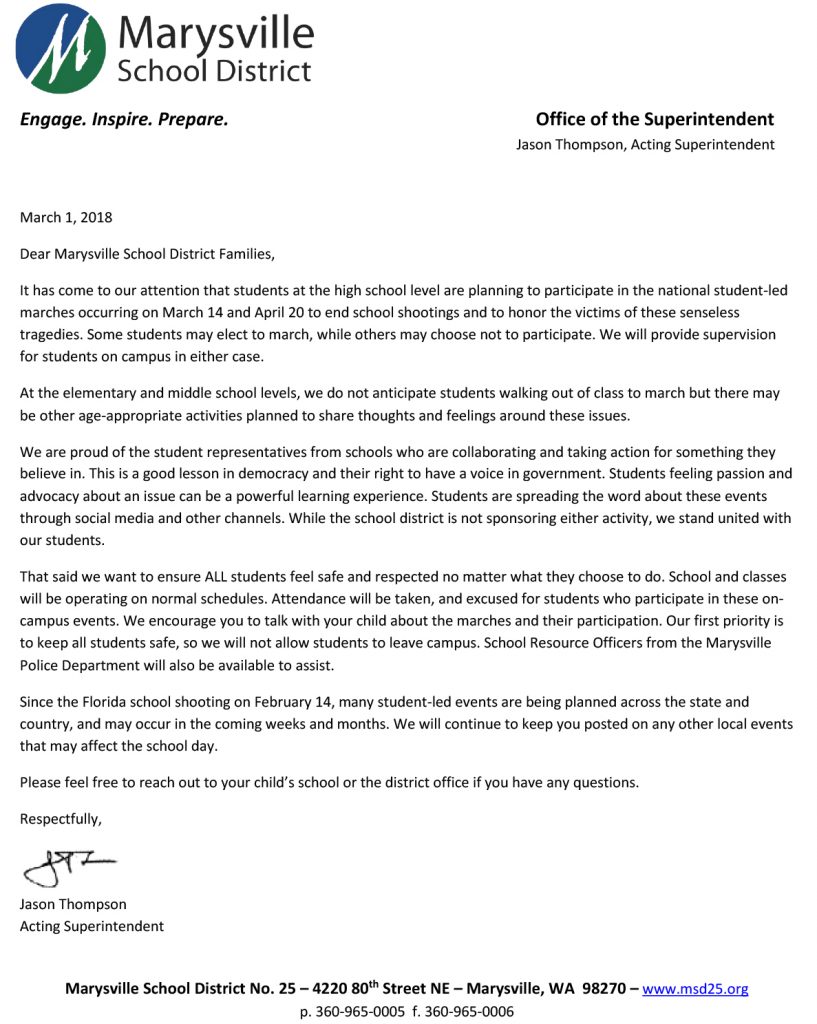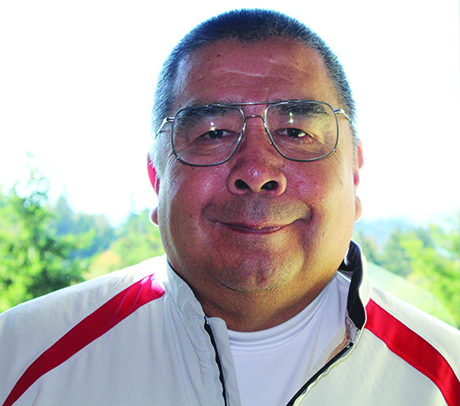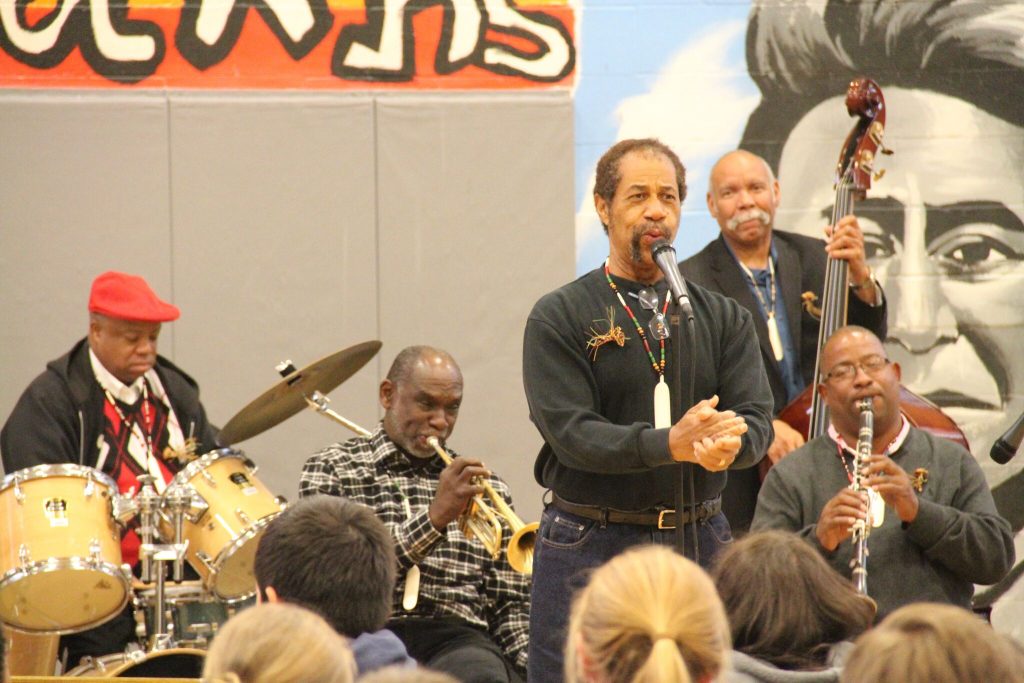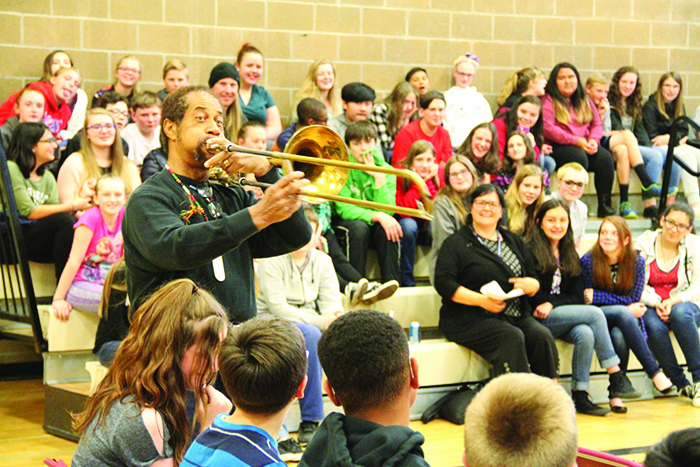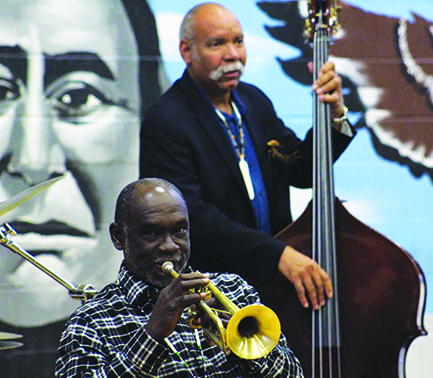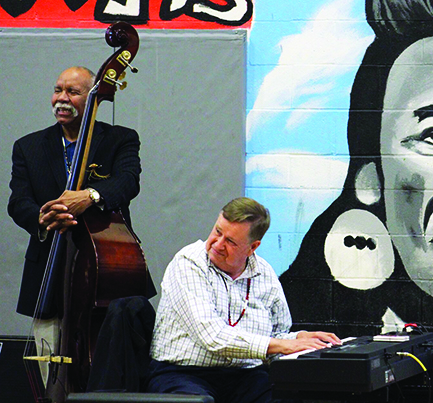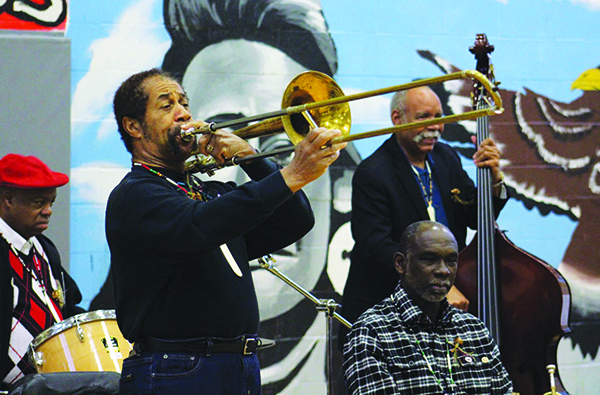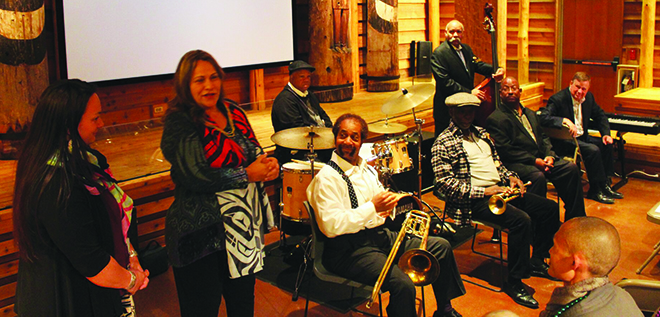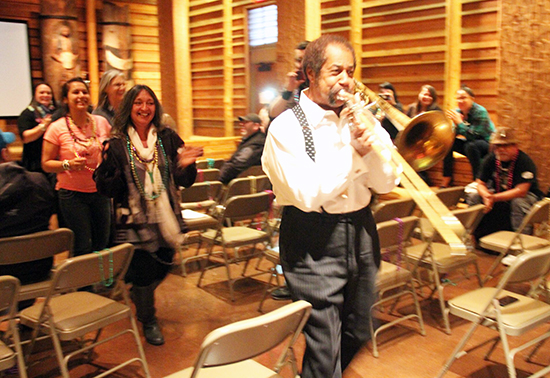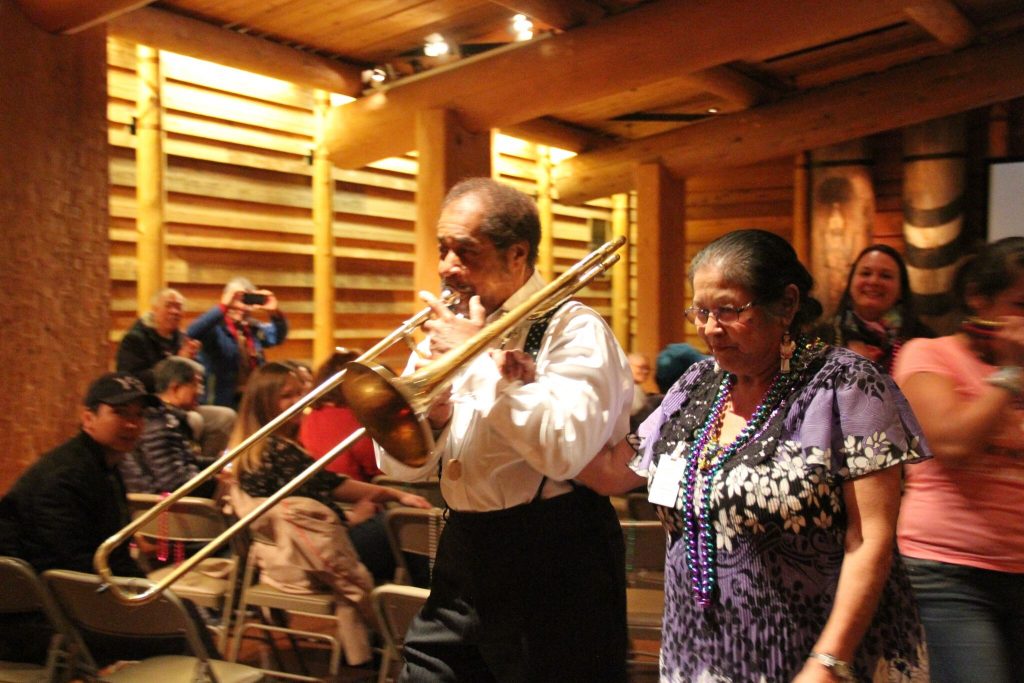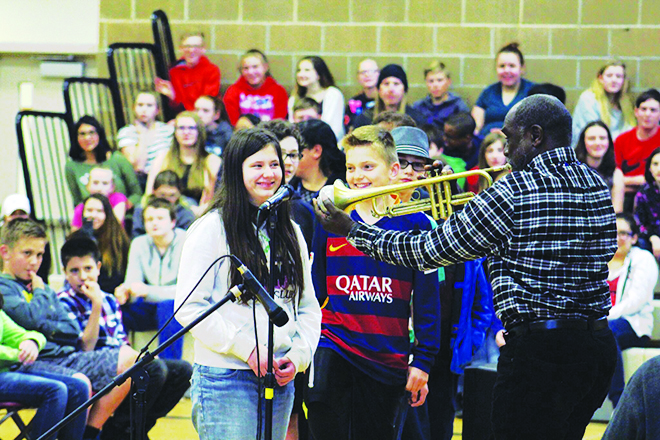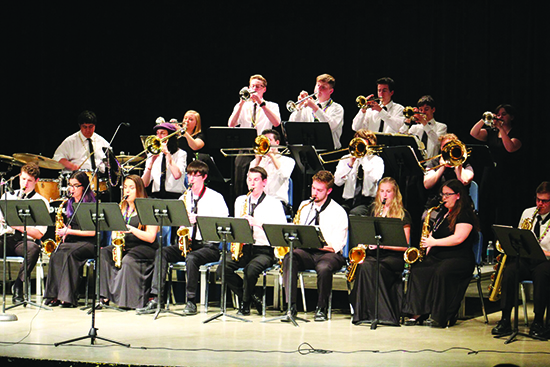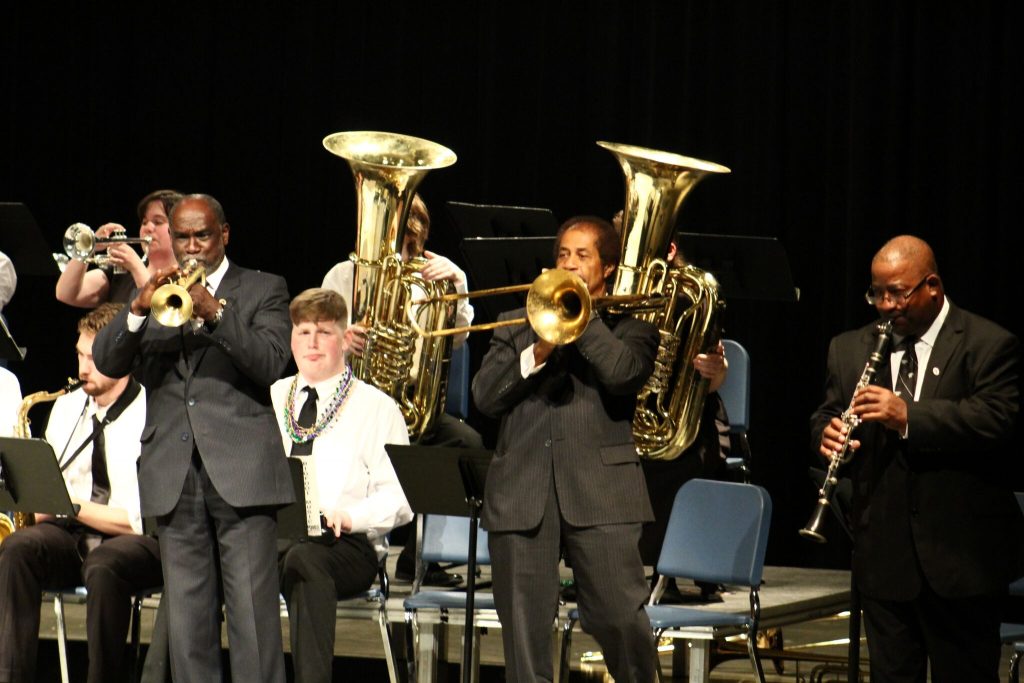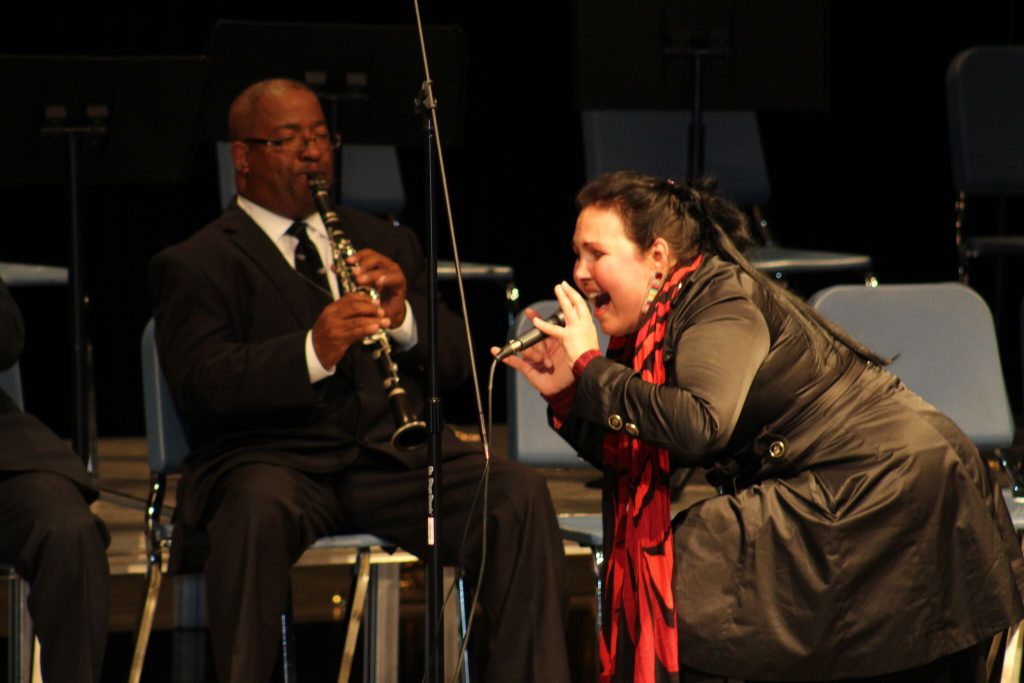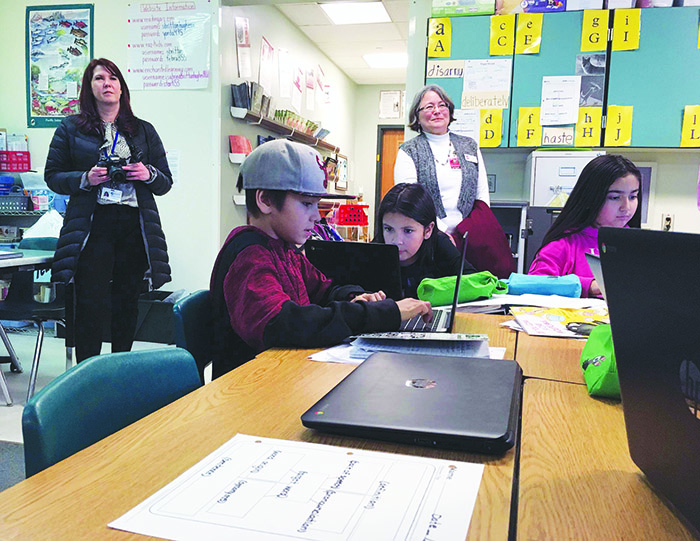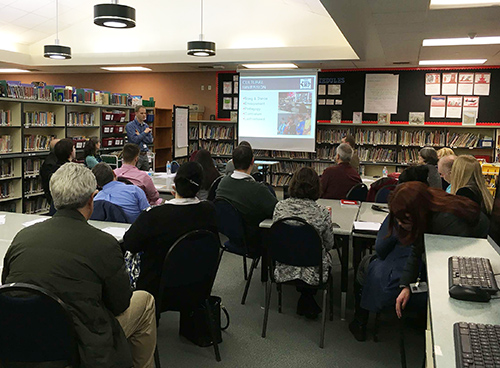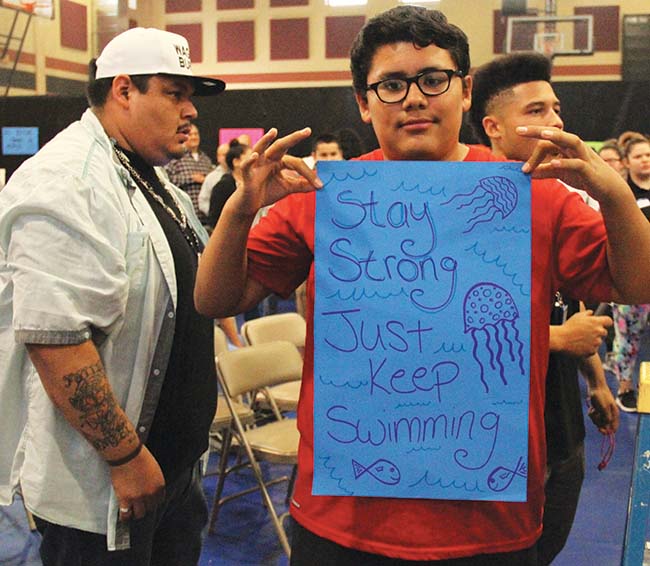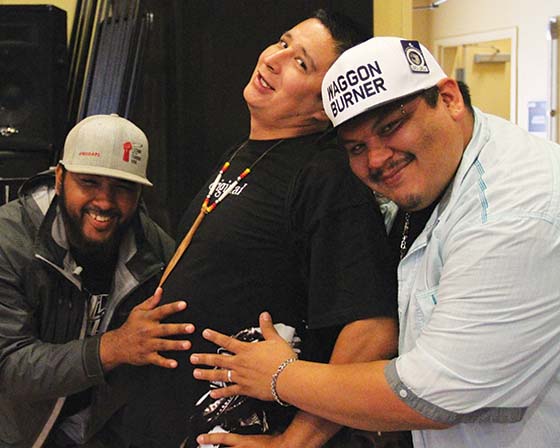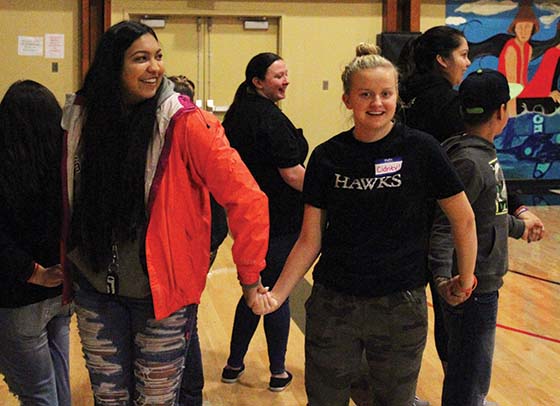In October of 2014, our community experienced first-hand the horror of a senseless school shooting. Unfortunately, we were not the last community to experience such tragedy. In light of the recent events, students across the country, including Marysville, are organizing to express their unique perspectives on this continuing national issue. We, the Marysville School District, support our students in exercising their First Amendment rights, including participation in the student-led marches. Our responsibility as educators is to keep students safe on campus, and to encourage respectful dialog and expression of ideas and beliefs. We stand beside our students in their advocacy and share our sadness for the loss of life in these senseless acts of violence.
Tag: Marysville School District
Ray Sheldon Jr. looks to bring fresh perspective to Marysville School District
By Kalvin Valdillez, Tulalip News
The Marysville School District (MSD) is comprised of twenty-two schools including ten elementary, four middle and eight high schools. The majority of Tulalip students attend schools within MSD as the entire reservation is under the school district. Tulalip is home to Quil Ceda Tulalip Elementary School, 10th Street Middle School, Tulalip Heritage High and Marysville Arts and Technology High School. MSD is split into five separate districts based on location, the Tulalip reservation is within and accounts for a large portion of District One. A representative from each district is elected by the community to serve on the school board every four years.
For the past eight years, Chris Nations has been the MSD District One Board of Director and is up for re-election this year. Tulalip tribal member, Ray Sheldon Jr. is challenging Chris for the District One seat and is progressively gaining more support as the election day of November 7 draws near. Ray has been actively involved within his community, coaching little league baseball for nearly thirty-five years. He also is a strong supporter for special needs children, volunteering his time to numerous non-profits including Leah’s Dream Foundation, an organization, founded by Tulalip member Deanna Sheldon, which assists local students with autism by raising funds, planning events and providing support to both parents and students.
“I’m an advocate for special needs and the kids that need care because I have four grandkids who are categorized as special needs,” Ray explains. “I don’t think the school district spends enough money for these people and kind of shoves them in the corner, which bothers me big time. I think we need to help those special needs children. Special needs doesn’t necessarily mean they’re stuck in a wheel chair, special needs are also the kids who have trouble reading or with dialect or anything else. The school doesn’t pay enough attention to them and we should start teaching and spending time with them.
“Budget-wise I feel they [MSD] just work for higher education,” he continues. “Those early years are really important. We should start in the beginning [of their education] and have therapists who are able to help these children. I think there really needs to be change with special needs education. It’s not just tribal children, its non-tribal too. We need representation for these children. We’re not getting it. We’re not getting it from Chris Nations, so we need to make a change so someone is there to represent our children.”
Former MSD board member, Don ‘Penoke’ Hatch, not only endorses Ray, but has been the main source of inspiration, providing the candidate with advice and encouragement throughout the race. In previous years, while Penoke served for MSD, community members voted only for their district representative; now community members can vote for all five district representatives. Ray believes that this procedure is flawed because it allows candidates to campaign outside of their district, therefore leaving many of the districts’ needs unattended when the candidate takes office.
“Don Hatch used to be on the school board. Years ago we used to visit on Saturday mornings, when he was a school board member, and he told me ‘when it’s time, you should take over because you care so much about the kids.’ He mentioned that he was getting up there in age but is still so passionate about it. I told him last spring that I really wanted to run this year. They changed the rules about district voting just before he left, so he told me it’d be an uphill battle. And it is an uphill battle, but he’s helping as much as he can. He’s inspired me to keep going and makes suggestions about where I can visit and help. My goal, if I get on, would be to make District One always a tribal district. That’s the way it should be. District One is a big district and since we’re a sovereign nation we should have that seat no matter what.”
During the 2016-2017 school year, MSD had just over 11,000 students attending their schools. Of those 11,000 students, six hundred and ninety-six were Native American and 1,749 students were special needs children. Over the course of recent years, MSD has slowly seen a decrease in attendance.
“We’re having a lot of children who are now leaving the school district and going to private schools,” Ray states. “I think sometimes they leave the school district because they’re not paid attention to, other than they’re just a number. Our future is really important, it’s important to have our children educated. It will be a better community and they’ll be great parents – that’s the whole dream. They can do it; they just need someone to make them understand that they can do it. This is the first year I coached the tribal baseball team, they just needed the confidence. I supplied that and they did really well, we only lost one game. All they lack is confidence and once you give them the confidence, they can do it. I think the teachers out here do their best because moneywise they can’t hire extra help. If we can better educate our people, maybe some of our issues will go away that we have in the community. I really think we need a Voc-Tech school in our high school area so the lower-tested kids can understand and learn a trade, like we do here with TERO.”
“There’s five districts, they meet a couple times each month and what bothers me the most is I’ve been to a few meetings and some of these members they’ll sit there and look at their watch and figure ‘we spent two hours here so it’s time to go’,” he expresses. “There are over 10,00 kids in the school district, you’d think they would push and put a little more effort into the schools and be able to help the Superintendent and give her the direction of where to go and how to help. I’d like to make them more accountable. What’s a little more disturbing is that a few years ago, it was up to nearly 12,000 students within the school district. They’re slowly dropping off because all these kids are also going to private schools where the curriculum is a little harder and they’re being pushed. They’re all treated like students, not the bottom third. That’s what I get a little frustrated with, they need to spend the time, whether its three or four hours, they need to have some sort of accountability to the kids. 10,000 – if you looked at it as if the Tribe used that same model, we’d be in trouble.”
Tulalip and Marysville community members who are not registered to vote in Snohomish County must do so online or in person at any Washington Department of Licensing office by October 9, in order to be eligible to vote for Ray during the upcoming election. Ballots will be mailed out to registered Snohomish County voters by October 25, and must be filled out and mailed by 8:00 p.m. on November 7.
“The reason I’m trying to get involved now is because for the past eight years the representative who’s in our district now hasn’t done anything for the tribal children – at all. So, we need a change quick,” urges Ray. “When he needs help, he never comes here to ask, this is where I would like the help. I think it’s really important that we need to make a change but I can’t do it myself. You can’t do it by yourself either. It needs to be done together so that we can get in there and let them know where they’ve been dropping the ball; and that they also need to worry about us. If we can get a tribal person on there who can help push and get the Tribe back involved with school, things will happen for the better.”
For additional information please visit the ‘Ray Sheldon Jr. Candidate for MSD #25 District 1 Director’ Facebook page.
Jazz Therapy: Preservation Hall Legacy Jazz Band visits Tulalip community
By Kalvin Valdillez, Tulalip News
As the last note of their second set was hit and spit valves were emptied, trumpet extraordinaire, Gregg Stafford, approached the microphone at the Francis J. Sheldon Gymnasium. He graciously thanked the audience of middle and high school students for the standing ovation he and his fellow band members of the Preservation Hall Legacy Jazz Band were receiving. The traditional six-piece New Orleans jazz band recently traveled to Tulalip to perform and speak with the youth of the community about jazz history, culture and the importance of keeping traditions alive. During their week-long visit the band performed for over 4,000 students at schools within the Marysville School District including Quil Ceda Tulalip Elementary, and Heritage, Getchell and Marysville-Pilchuck high schools.
After the much deserved cheers and applauds began to quiet down, Gregg informed the students that the band would be answering any questions the students had for them. The kids asked a variety of questions ranging from who is your favorite jazz singer to more complex questions regarding mutes, tempo and time signatures. Inevitably, a student asked ‘how long have you guys been playing?’ In this moment Gregg, along with trombonist Fred Lonzo, clarinetist Louis Ford, pianist Lars Edgrean, bassist Richard Moten and drummer Joesph Lastie Jr collectively grinned as Greg looked at his watch and responded ‘oh about twenty-five minutes now.’ Laughter filled the entire room, most notably from the band.
Those small joyful moments, within the twenty-five-minute jazz set, where the entire room is smiling ear to ear, sharing laughter with one another and getting lost in the music is the reason Tulalip Tribes Employee Assistance Counselor, Jessica Talevich, brought the Preservation Hall Jazz Band to the Pacific Northwest.

Nearly two years ago, after witnessing the band live in their native New Orleans and once again in Seattle a week after, she discovered the band offers outreach work to high schools nationwide. In the wake of tragedy amongst the Tulalip-Marysville community, Jessica consistently witnessed division as several messages from ‘talk-based’ outreach programs missed their mark and constantly reminded community members of their hard times.
In an effort to change the cycle and promote healing, Jessica and the Tulalip Tribes partnered with the Marysville School District to bring the unique outreach program to the community.
“They just exude so much joy,” exclaimed Jessica. “The history of New Orleans is built on tragedy. From the early days of illness’ and diseases killing off many people, to the whole city burning to the ground and being rebuilt, and slavery is a whole other aspect. And then there’s instance after instance of hurricanes coming through and decimating [the city] such as Katrina and then the gulf oil spill that happened after [Hurricane Katrina]. These are resilient folks and their culture and arts, especially their music, have a lot to do with their resiliency so I wanted to bring that up here and talk about creativity as a tool for resiliency.”
After a tour of Tulalip, hosted by Tulalip tribal member Freida Williams, the band performed for the community at the Hibulb Cultural Center. Plenty of audience members danced and joined in a march led by Fred while he performed a solo on his trombone. Following the performance, the band had an open discussion with the audience touching on subjects such as the ever-changing music industry and music education. Gregg inquired about the local population of black bears and the tribe’s hunting regulations.
Tulalip tribal member Natosha Gobin and her children were present for nearly every Preservation Hall Jazz Band performance to offer prayers and gifts to the musicians.
She states, “It was a good week, my kids had so much fun! I think that music is such a great outlet and sometimes there are youth out here who kind of feel overwhelmed with not knowing our own traditional songs or like they can’t sing their songs and express themselves through our culture. And I think that a lot of the youth were able to find a connection and a love and passion for another music outlet and they understand more about Preservation Hall, although they are not an Indigenous group. They’re not a tribe, yet everything that they struggled with is parallel to what our people struggle with. So you can make those connections and those connections help – they’re inspiring for kids. For our youth, I think its inspiring that music does have a culture.”
On their last night in the community, the Preservation Hall Jazz Band spent the evening performing for a large crowd in the Marysville-Pilchuck auditorium. Both Getchell and Marysville-Pilchuck high school jazz bands showcased their skills for Preservation Hall. Fred, Louis and Gregg made special appearances and performed alongside the bands.
During their final performance the band shared the stage with Native American Grammy Award Winner, Star Nayea. The band played Dixieland jazz, jazz blues, and ragtime as well as jazz funeral music. The audience was highly engaged and interactive throughout the bands last set. The crowd sang along to classic songs such as What a Wonderful World and A Closer Walk with Thee. Nearly everyone in attendance marched around the auditorium before rushing the stage while the horns blew to the tune of When the Saints Go Marching in.
“Witnessing the interactions between our musicians with students from the Tulalip community was both inspiring and impactful,” states Preservation Hall Foundation Program Director, Ashley Shabankareh. “We saw such passion from students in the community for their own cultural traditions and were able to make meaningful connections to how we pass traditions in New Orleans. This trip is something myself and our musicians will never forget – we were overjoyed to see the power of music bringing communities together.”
For additional information about the Preservation Hall Jazz Band please visit PreservationHallJazzBand.com
ABC Curriculum promotes healing at Tulalip schools
By Kalvin Valdillez, Tulalip News
During a recent visit from the Washington State Board of Education, Quil Ceda Tulalip Elementary (QCT) provided an inside look at their ABC curriculum, an acronym for the new approach to the education system within the Tulalip community. ABC stands for the Academic instruction, Behavioral and social-emotional support and Culture based curriculum that the Marysville School District and the Tulalip Tribes have recently began implementing at the elementary.
QCT is one of few schools in Washington State that is integrating traditional Native teachings into school subjects such as music, art, language, math and history. The school often invites tribal members to help teach the children about the Tulalip culture. Each morning the school holds a fifteen-minute assembly where students perform traditional song and dance. QCT holds an annual cultural fair where tribal members are invited to share traditional foods as well as tribal history with the students. The elementary school also observes Tulalip Day every November and holds a fifth-grade potlatch at the end of each year. Most recently the school held a Billy Frank Jr. themed spirit week, honoring the man who dedicated his life to fighting for Native American fishing rights.
“We all had heroes growing up. I remember going to the library and spending all day reading about Lou Gehrig, Babe Ruth and Jim Thorpe. You know growing up as Indian People, we don’t have a lot of Native heroes we can look up to, but Billy Frank Jr. is a true Coast Salish hero. He is someone we all look up to because of the amazing work he did for fisheries. Thank you for honoring him, he definitely deserves to be celebrated,” stated Tulalip Chairman Mel Sheldon.
The ABC curriculum puts emphasis on family and community, connections that are often strong in Native America. QCT makes an effort to communicate regularly with their student’s family members. The school also ensures the students stay up to par with the utilization of modern technology, both for research and to create documents. During a classroom walk-through the State Board of Education observed the curriculum in action during an art class as well as a writing class.
Representatives from the Tulalip Board of Directors, Marysville School District and QCT faculty spoke about cultural assimilation and the affect it left on Native communities. Each explaining to the Board of Educators that assimilation caused trauma that is still affecting the descendants of boarding school victims today, although the events occurred several generations prior. Families were broken and cultures were stripped during the ‘kill the Indian, save the man’ era.
“Our people were [originally] taught in a traditional way at the foot of our grandmothers, not in classrooms but out in nature. When the education system was forcibly put on us, it was done in way that stripped everything away from our children. It was done purposely to take away who we are as Indian People in a very painful way. That was our introduction to education. Since then we’ve had elders try to get this work, our voice and our story, into the public schools to try to heal. I believe we are continuing the work of our ancestors,” states Tulalip tribal member and QCT Instructor, Chelsea Craig.
The tribe, school district and Board of Educators are well aware and prepared for the hard work that will be required, and they started the healing process through the ABC curriculum.
Senator McCoy shares thoughts on MSD education issues
By Micheal Rios, Tulalip News
On Tuesday, October 18, the Marysville-Pilchuck High School auditorium was home to Marysville School District’s first Education Town Hall. The panelists included Washington State Representative June Robinson, Marysville School Board President Peter Lundberg, and Tulalip tribal member, Senator John McCoy.
“Senator John McCoy and Representative June Robinson serve the communities of Everett, Marysville and Tulalip in Olympia during the State Legislative Session which starts every year in January,” states Dr. Becky Berg, Marysville School District Superintendent. “When they are not in Olympia, they also work tirelessly for our local communities in their day-jobs and by meeting and working with citizens to understand concerns and advocate new ideas.”
During the 90-minute Town Hall discussion the focus was all about education; from defining what basic education is, how to best educate MSD students, and how that education may be funded going forward. Senator McCoy took point on many of the discussion questions and, as is his style, didn’t hold back with his honest assessments and ideas on how to best equip MSD students with a quality education that yields productive citizens.
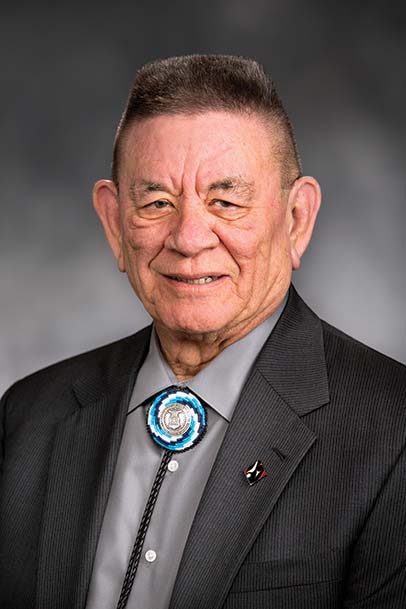
Photo/wastateleg.org
In your opinion, what is basic education?
“Because we have such a diver legislature, lots of different opinions, there are a lot of different ideas about what basic education is. You can say we are constantly defining basic education because each community across the state of Washington is a little bit unique in terms of their diversity and needs. For the students, their community determines what they need survive in that area. I’ve been preaching that you have to take it community by community, which means the school districts, and they have to decide the necessary skill sets of that community in order to survive. For every community, there is a focus and codes of language based on the resources in that area.
Here in the Everett/Marysville/Tulalip area we have Boeing, Fluke, and medical centers. These are technical companies, companies manufacturing aerospace parts, and a large contingent of the healthcare sector. So we have to figure out what needs to be in the skill sets of our students in order to take advantage of these local companies. That’s going to be a different skill set required than students in the Tri-City area, or the Bellevue area, or the Neah Bay area. Each community needs to work on what is required for them to survive and they should gear your education systems to those requirements.”
How do you propose to level the educational playing field?
“I’m watching out for that square peg trying to get into the round hole. No child walks through the door with the same information, even if they live in the same house. We have to get down to where they are, find out where they are, so that we can educate them. Now not every kid is going to be a STEM person (STEM is a curriculum based on science, technology, engineering and mathematics). That’s probably only 15-20% of students who are going to be STEM people, so why are we gearing everything to STEM? By doing that we are leaving 80% of our students behind when they could be trained up to be very productive citizens of the community.
Whenever I talk to kids I tell them ‘find that one thing that makes you want to get up in the morning and go do it’ because there will be some crazy guy like me who will pay you to do it. Be happy in your work. I think we’ve all seen people who are not happy in their work and their product showed it. Not everyone is going to be an engineer or become a programmer. So that’s what we have to do, we have to get our educators to where the kids are. I have the highest respect for every teacher in the system. I thank them every time I can. They have a hard job. They’re educating the people who are our future. We need to prepare them for everything.”
We seem to all agree that the State needs to meet its duty to fully fund education. In your opinion, where should the money come from?
“The fact remains we need to devise a system that will have everybody in the State participate, everybody. Not everybody is participating in the revenue process. Right now, because of our sales tax system, the middle class and low-income are carrying the burden of all taxes. The upper incomes are pretty much unscathed, so we need to devise a method that everybody participates.”
What do you see your individual role being during the 2017 State Legislative Session when it comes to the State’s mandate to fully fund education by 2018?
“Well, I’m not on any of the finance committees by design. In my prior life I did a lot of working with budgets and quite honestly I got tired of it. Now, I delve into just policy. But that does not relieve any legislator from their responsibility to do due diligence and fund education. We all have something at stake. We all have skin in the game to bring it home for all students in the state of Washington, all students. We need to work together, with one another in order to achieve this.
One thing the Supreme Court was quite clear on, and I agree with, is that salaries should be part of basic education. There will be lots of discussion and we need to solve that problem and move forward. We all have hard work to do and I think we’re up to it. We’re going to do the best job we can to fully fund education so all our kids down the road can become productive citizens.”
What is the one thing you’d like to see the State Legislator accomplish this session when it comes to K-12 education?
“I’ve been in the State Legislator for fourteen years and twelve of those fourteen I’ve dropped the bill to delink, and I will continue to do it. The last three years the Chair of the Senate Education Committee refused to allow that bill to come up, to not even be heard. I will submit another bill to clean them out again and see what happens.
I think the Education Committee ought to be disbanded for five years. Everybody thinks they’re an expert when it comes to education. The Legislator turns over 20% every two years and out of the group we get all these folks who think they have the magic fix. That’s why we have an unsettled education system because every two years a group comes in who wants this or that and everything remains unsettled. We have to stop, let things settle, and see the process work. In my opinion, we have a pretty good school system, but we keep messing with it. We need to stop that and allow current processes to work.”
In your opinion, what skills and capabilities do students need to be a productive citizen?
“That depends on the child. Autistic students can demonstrate great skill and be productive when they are educated at their level. They have skills that will help the community. Every child in the State of Washington has the capability to be a very strong citizen and be productive in this state. Like I said earlier, we have to find out where the student is at and teach them at their level.”
Contact Michael Rios, mrios@tulaliptribes-nsn.gov
Young Active Native Americans: We Choose Life
Article and photos by Kalvin Valdillez
Unity Month, held in October, was designed by the Marysville School District and the Tulalip Tribes to unite the youth of the community to heal together and raise awareness to topics such as domestic violence, substance abuse, and suicide. During Unity Month many events are held such as Friday Night Lights, a fieldtrip to the corn maze, and perhaps most importantly the Young Active Native Americans (YANA) Conference hosted by Tulalip Youth Council.
Focusing on healing and love, the October 18 conference included raffles, activities, and one insanely fun icebreaker where the youth played an adaptation of musical chairs. Instead of chairs, they were assigned a random partner, and instead of sitting they had to find each other amongst the crowd within five seconds and touch each other (example: elbow to elbow or knee to forehead).
Native American activists Chad Charlie, Calina Lawrence, LoVina Louie, Mylo Smith, and Deborah Parker were in attendance to teach workshops and talk to the youth about leadership, self-care, suicide prevention, healthy relationships, and growing up on the reservation.
Tulalip tribal member Deborah Parker spoke to the youth about domestic violence, sexual abuse and how to have thriving healthy relationships as a survivor.
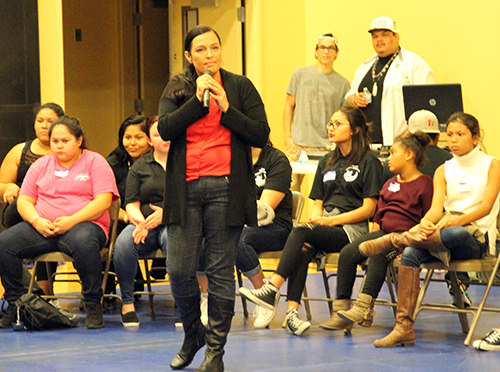
She states, “When you’re young, having good positive self-esteem is difficult especially if you’re a survivor of sexual abuse. I think in this generation we’re finally now openly talking about both sexual abuse and domestic violence. We’re now talking about the importance of having a healthy relationship not only with yourself but with others as well.”
Deborah continued by informing the youth of the recent findings of sexual abuse in Native America. She stated that this past April, research showed that 87% of young female Natives were abused and 83% of young male Natives were abused. She urged the kids to be aware because the abusers are usually people they know.
“I’m no longer ashamed to say I’m a victim of child sexual assault. I was embarrassed until I was 24 years old. Not often are the perpetrators unknown to us. Sometimes it’s going to be someone you love and trust like family. It’s could be a cousin, uncle, grandfather, and yes sometimes it’s even aunties. Do not be ashamed if it’s happened to you. That’s how we are going to break the silence and stop this. We’re going to speak the truth. Victims should not be shamed or blamed. We are going to raise our voices and raise awareness so the perpetrators who hurt us, won’t hurt others. We need love. That’s the foundation we need, and it begins by loving yourself. Self-love is so important. Believe in what you have, only you know what it is, and take care of it. And please take care of your spirit.”
Deborah’s speech prompted two tribal members, a youth and an elder, to share their stories.
Velda Gobin, Tulalip Education Manager and Tulalip Elder drew from her past experiences with abuse.
“[Sexual abuse and domestic violence] hasn’t changed since my generation. Its still happening and the same type of people are still doing it. When I was young I grew up in a dysfunctional family, there was a lot of drinking. My stepfather was violent and used to beat my mom all the time. I was the oldest so I had to hide my brothers and sisters.”
Velda went on to explain that although her stepfather physically abused her she was never sexually abused. She continued, “but I was molested by a cousin, a girl. It’s people you love and trust who usually do this. If it’s happened to you, I hope you speak to somebody because you shouldn’t have to go through this alone.”
Young Tulalip tribal member, Perfecto Diaz, had to express his thoughts and feelings to his peers. Deborah’s words sparked something inside him that made him take the microphone and address what he believes is a division between the adults and youth.
Perfecto stated, “I’ve been having a tough life so far. I know you guys talk a lot about love, but when you come around I don’t feel it. We don’t see it. I want to be a role model to these kids. I write music and poetry in my free time. I have things to say. I am a survivor and I’m still going through the struggle every single day. I went through beda?chelh and the system. I am angry but we need a positive role model, so that’s what I am going to be. There’s wicked people out there. They’re not playing games. I pray for every kid here going through the struggle because I’m out here grinding every day, going through it with you.”
Perfecto’s words resonated throughout the rest of the conference. Each speaker congratulated and thanked him for speaking his mind, including Comedian/Activist Chad Charlie.
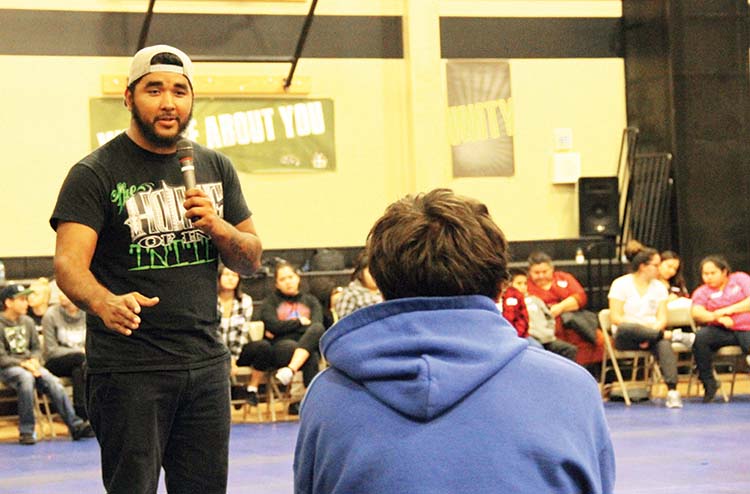
Chad stated, “I want to say I have a lot of respect for [Perfecto], he spoke his truth. We need more young people to stand up and utilize their voice and speak on the reality of our world as Indigenous People.”
Chad has spent the last two months in North Dakota protesting alongside the Standing Rock Sioux against the Dakota Access Pipeline. He talked about finding his path in life. Over the past five years Chad has been making a name for himself as a stand-up comedian. He states because of the name he built for himself, he was able to use his voice to reach a larger audience regarding this much bigger issue. Chad spoke to the conference attendees about suicide prevention.
“I want to remind every single person that you all have a purpose. Regardless of how small or large those purposes are; they all mean something. It could be cooking, singing, writing poetry, making people laugh. Those purposes can change the world,” expressed Chad.
LoVina Louie, Native American Activist, gathered everybody and faced them towards a handmade sign that read We Choose Love. She then called Perfecto to the front of the crowd and had everybody place a hand on each other’s shoulder. “Perfecto said he heard a lot of talk about love but doesn’t feel it. I want to make sure that he and everybody in this room know they are loved.” LoVina then led the group in prayer, asking for a cleansing throughout the Tulalip community.
Tears were shed but there was no shortage of laughter. Serious topics were discussed and entertaining games were played. Both hugs and prizes were handed out. As the first annual YANA Conference came to an end, the youth of Tulalip began the healing process together.
Marysville School District works to ensure tribal heritage and culture is visible, shared and preserved
By Dr. Becky Berg, Marysville School District Superintendent
Recently, a conversation was overheard at the Hibulb Cultural Center. A young woman was talking about her tribal history. Her grandmother was a student during the boarding school era and the young woman said that while growing up she rarely learned about her tribal history and culture. She added that her grandmother often hid her cultural affiliation, as well as her ability to speak Lushootseed. In turn, her father never learned the language or embraced his native heritage. This was difficult for the young woman to understand, as at a young age, she chose to dedicate her career to educating herself and her community about her region’s rich cultural history, and her own tribal identity.
As a community, we are lucky to have tribal members and others who have had the strength to stand up and ensure tribal history and culture is recognized, shared and preserved. Our community, our school district, and our local leaders must also take on this charge and do what is necessary for our entire community to understand where we have been, where we are today, and where we are going.
In November of 2014, The Marysville School Board of Directors took the historic action of officially adopting the “Since Time Immemorial” (STI) Tribal Sovereignty Curriculum so that all students learn about the history, culture, government, and experiences of their Native American peers and neighbors. Partners who were instrumental in this effort included Denny Hurtado, former OSPI Office of Indian Education staff member, and State Senator John McCoy.
This curriculum was adopted in advance of Washington State Senate Bill 5433, which passed in 2015 and mandated that Washington’s Tribal history, culture and governance be taught in all Washington schools by 2016-17.
The adoption of the STI curriculum seeks to remedy a grave omission by our educational system. American history begins with the story of indigenous peoples in all parts of the land. Yet for decades our curriculum has made this rich and important heritage and culture virtually invisible. The lack of awareness of the Tribal legacy in our Marysville-Tulalip community is especially glaring given the presence of the Tulalip Tribes within our district boundaries. Teaching the STI curriculum to all students in our schools is a matter of basic justice for all, especially for those who were made to feel ashamed of their identity and culture for far too long.
The “Since Time Immemorial” provides engaging lessons. The lessons are thought provoking and are meant to help students understand multiple perspectives. During the 2015-16 school year, the curriculum was implemented in grades Kindergarten through 5, and this year it has expanded to all secondary schools district-wide.
Every day I feel deeply honored to be a member of this community and to be welcomed by tribal leaders, elders, parents and students. And every day, the Marysville School District will work to ensure our community’s tribal heritage and culture is visible, shared and preserved.
To learn more about the Since Time Immemorial curriculum, please visit www.indian-ed.org.
Unity and Wellness Month jam-packed with activates
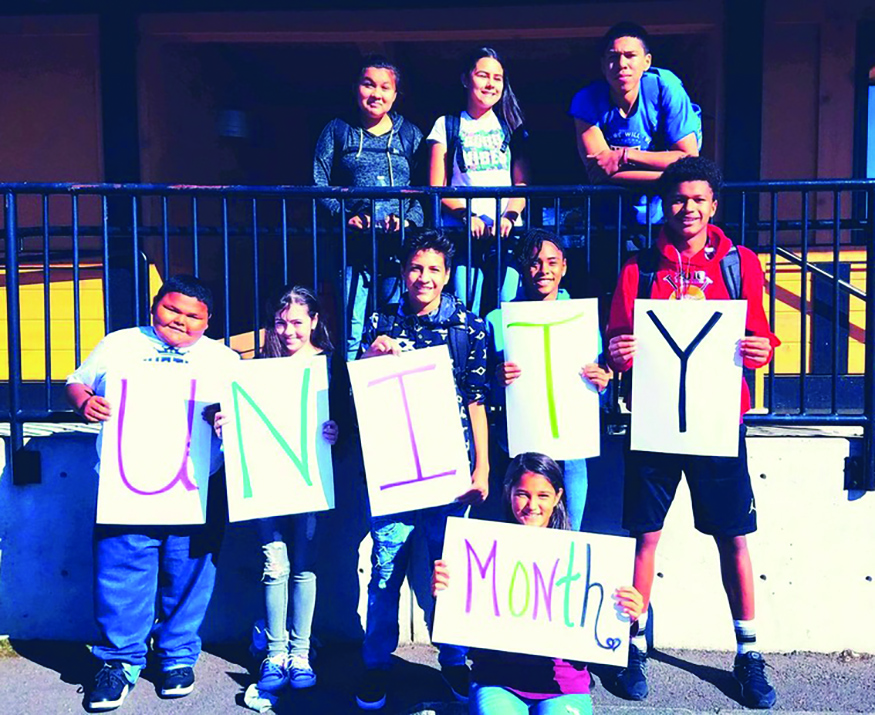
By Kalvin Valdillez, Tulalip News
The Tulalip Tribes has teamed up with the Marysville School District to officially declare October 2016 as Unity and Wellness Month or #TMUnityMonth. The Tulalip Youth Services, Behavioral Health, and Boys and Girls Club are among the several tribal programs banding together to promote healthy living for the youth of the Tulalip/Marysville community.
The month of October is jam-packed with activities. Nearly every day the youth have the opportunity to take part in events such as a movie night, a color run, and a field trip to the corn maze.
Additionally, each week of October will have a themed topic and every event held that week is based on that topic. For example, the third week of October is Bullying Prevention Week, during which the First Annual YANA (Young Active Native Americans) Conference will be held and hosted by the Tulalip Youth Tribal Council. The conference will include guest speakers, workshops, and activities that focus on bullying and suicide prevention.
#TMUnityMonth celebrates life and heal by bringing the youth together for events, support groups and conferences.
October 1-9
#TMUnityMonth Kick Off Week
Events to Remember:
10/06/16 Youth Center Peer Support Group (6th-12th Grade) 7:30pm-8:30pm
10/07/16 Friday Night Lights (All) 6:00pm
October 10-16
#LoveIsRespect Domestic Violence Prevention (Healthy Realtionships) Week
Events to Remember:
10/11/16 Youth Center Open House (All) 5:00pm-8:00pm
10/14/16 Healthy Relationship Workshop & Corn Maze Field Trip (6th-12th Grade)
October 17-23
#KindnessMatters Bullying Prevention Week
Events to Remember:
10/18/16 YANA Conference (6th-12th Grade) 8:00am-2:00pm
10/19/16 Movie Night at the Boys and Girls Club (Kindergarten-5th Grade)
October 24-31
#BeDrugFree Substance Abuse Prevention Week (Kindergartern-5th Grade)
#SaySomething Suicide Prevention Week (6th-12 Grade)
Events to Remember:
10/28/16 Harvest Fest (All) 2:00pm-5:00pm
10/28/16 Color Run (All) 5:00pm
For a complete schedule and further details visit www.TulalipYouthServices.com
Marysville School District partners with Everett Community College to help students plan their future
Source: Marysville School District
MARYSVILLE, Wash. – Recognizing that early exposure to career options after high school is becoming increasingly important for student success, the Marysville School District, in partnership with the region’s leading educational institutions, civic organizations, and businesses, is hosting the fifth annual Opportunity EXPO on April 19.
The “My Future, My Choice” EXPO is a dynamic college and career-ready event for students across Snohomish County. The EXPO provides students with direct access to 2-year and 4-year colleges and universities, technical and trade schools, and military and civic organizations. Students also have the opportunity to meet and network with community leaders from business, government, and non-profit groups throughout Washington State.
This year’s sponsors include the Tulalip Tribes, Everett Community College, Washington State University North Puget Sound at Everett, Everett University Center, Junior Achievement of Washington, Marysville Tulalip Chamber of Commerce, and the Marysville Rotary and Rotary Education Foundation.
The Opportunity EXPO will be held at the Everett Community College (EvCC) campus and includes tours of EvCC’s new Advanced Manufacturing Training & Education Center (AMTEC), a visit to the home of EvCC’s Health Sciences programs, and campus-wide tours, giving student’s a greater understanding of the many opportunities available to them.
“We look forward to welcoming students from Marysville and Tulalip to Everett Community College,” said EvCC President David Beyer. “Today’s economy demands a highly educated workforce with a sophisticated and transferable set of skills. Together, with the Marysville School District, we are equipping students with the knowledge and tools they need to build successful futures.”
“We are committed to ensuring every student sees the many opportunities provided to them as they consider their path after high school, said Marysville Superintendent Dr. Becky Berg. “Students need to know success is ready and waiting for them to grasp. We are thankful to Everett Community College and our dedicated local community organizations for their ongoing work to show our students that anything is possible. As part of our Strategic Directions; the EXPO prepares graduates for economic and social realities by equipping them for future education, career, and citizenship in our globally-connected communities”.
All high school Juniors in Marysville and Tulalip will be bused to the EvCC campus on April 19 to attend one of two sessions. More than 100 colleges, career, technical and trade vendors, as well as business, community service and military representatives will be present. Schools and companies interested in participating or sponsoring the event should contact Jodi Runyon at 360-965-0001 or Jodi_Runyon@msd25.org.
Marysville School District provides free SAT exam to juniors on April 12
Contact: Marysville School District, www.msd25.org
